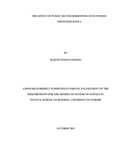| dc.description.abstract | Public sector borrowing is the debt owed by a central government. In federal states,
government debt may also refer to the debt of a state or provincial, municipal or local
government, the borrowing resource as one of the main supplements that fill the
financing gap should yield at least an interim period growth for many developing
countries The effect of external debt on growth may also be obtained from the efficiency
of external debt management, when the debt funds are channeled into growth promotion
orientations with effective usages that can make the positive effect of debt on growth
more than the negative effect. The study sought to determine the effects of public sector
borrowing on economic growth in Kenya. The research was based on Debt Overhang
Theory, Theory of Expenditure, and Neoclassical Growth Theory. This study adopted a
descriptive research design, secondary data was collected in this study. The study used
secondary data on external borrowing from the Ministry of Finance, Kenya National
Bureau of Statistics, and Central Bank of Kenya (CBK), internet, world development
indicators and World Bank data. The data was collected from 1964 to 2014. Data was
analyzed using SPSS version 21.0. The study established a significantly strong positive
correlation between economic growth (GDP) and domestic debt (r=0.990, p=0.000),
external debt (r=0.963, p=0.000), domestic interest (r=0.954 p=0.000), domestic debt
redemption (r=0.923, p=0.000) external interest (r=0.707, p=0.000), external debt
redemption (r=0.692, p=0.000). The study also established a significantly weak and
negative correlation between the rate of inflation and economic growth (GDP) (r = 0.385,
p= 0.039. The study concludes that Kenyan economic growth rate is significantly
influenced by public borrowing. Particularly, debt payment and interest negatively
influence economic growth in Kenya. The study recommends that the Kenyan
government should encourage sustainable external borrowing provided the funds are
utilized in productive economic avenues. The government should institute efforts to
channel domestic debt revenue to productive activities in the economy so that debt does
not rise to become unsustainable. This would require funding well appraised productive
projects to foster economic growth. Excessive domestic borrowing can be inflationary
and may crowd out private sector borrowing; therefore close monitoring of government
borrowing through the domestic market is therefore necessary. The study revealed that
moderate inflation rates can yield gains in GDP growth; therefore policy makers in
Kenya should low rates of inflation in order to foster higher economic growth. | en_US |

